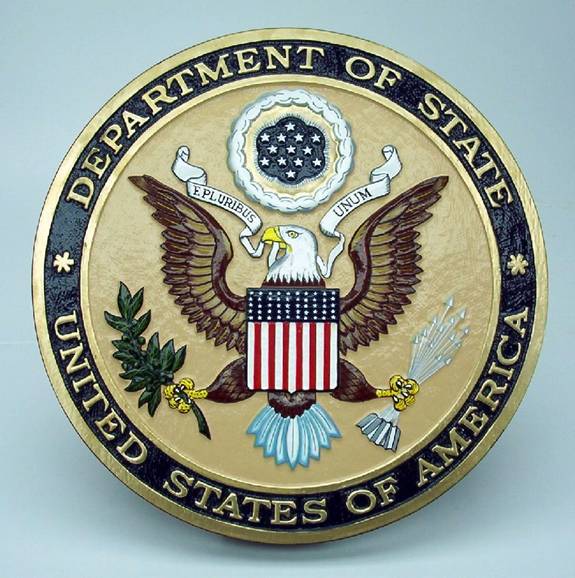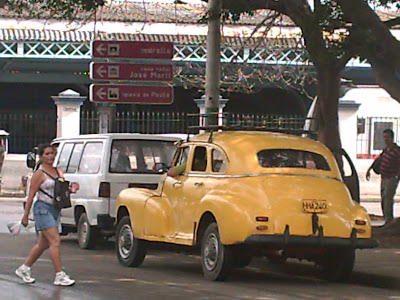The night before I had met some Habaneros (remember, citizens of Havana) on the Malecon. I struck up a long conversation with one of them, Carlos, and we spent a few hours walking the Malecon talking about life in Cuba, etc. The next day he agreed to meet me at my hotel following my delegaton research acitvities for the day. He wanted to show me his favorite spots in Old Havana.
Since you can't use American credit cards in Cuba, I had to bring all the money I thought I'd need to spend with me. I underestimated slightly and was now left with just three Convertible Cuban Pesos (CUCs), or about three dollars U.S. One CUC is worth about a dollar and is equivalent to about 20 normal Cuban pesos. Put another way, a normal Cuban peso is worth about a nickel. Tourists are generally required to use the CUCs, and Cubans use the normal pesos. For example, a bottle of water that costs a tourist two CUCs will cost a Cuban citizen two normal pesos -- two dollars for me and 10 cents for the Cuban citizen.
Well when I met Carlos the next afternoon, we decided to make the most of my three remaining CUCs. He handed them to a street vendor and received 60 normal pesos back. With this, we spent the afternoon eating and visiting sites in the narrow, noisy, crowded, crumbling streets of Old Havana:
-- First stop was at a kiosk where we bought a yummy Cuban confection made from peanut butter.
-- It made us thirsty so we hunted for cold soda. "No frio" was the only answer we got at several storefronts and kiosks. No refrigeration or ice meant the only sodas they had were warm.
-- We made our way to Carlos's favorite lunch place in the area, Cafe Habana. He introduced me to two Cuban dishes I hadn't seen before: "crema de queso" and "papas fritas con huevos" -- a bowl of thick creamy soup of melted cheese, followed by paper-thin french fries served over a fried egg. Both were filling and yummy.
-- Our next destination was "La Casa Natal de Jose Marti" -- the birthplace of Cuba's George Washington, Jose Marti. On the way, we passed a few of Carlos' friends on the streets, accepting a shot of Cuban rum here and there (a typical greeting between friends on the street) and dodging uniformed Cuban schoolchildren heading to class.
-- We toured Jose' Marti's home and learned a lot about the life of this 19th century Cuban who died in battle against Spain fighting for Cuban independence. Inside, a young Cuban military officer was tenderly explaining some of the exhibits to his little daughter. Here is a nation, I thought, ignored, denigrated and demonized by my government for half a century, that has a proud history and rock-solid patriotic tradition all its own.
-- Across the street from the Marti birthplace, we walked to Havana's impressive central train station, designed by an American architect, bustling with Cubans from all walks of life heading to various parts of the island. Next to the train station, we passed a surviving section of the huge Spanish-built wall that once surrounded all of Old Havana. Groups of Cuban teens played impromptu games of baseball, using the wall as their backstop.
-- It started to rain so we moved on and came upon an ice cream stand. We ordered soft-serve strawberry/vanilla twist cones that were so yummy we got two each. A group of four elementary school kids passed by and Carlos sung a bit of a song from a popular Cuban kid's show, which got their attention. Some funny comments I didn't understand were exchanged, and as we left Carlos flipped the kids a couple pesos each.
-- By now it was getting late in the afternoon and we started to head back to my hotel so I could meet my delegation for the farewell briefing and dinner. We passed a bar and Carlos said, "How about some rum?" As we toasted to friendship between the United States and Cuba, I eyed a black-and-white framed photo of Che Gueverra hanging on the wall behind the bar. Turned out this had been one of Che's hangouts.
-- With a few minutes to kill, Carlos and I found a bench and hung out in the park across the street from my hotel. A police officer with a police dog in tow took up position a few feet from us, surveying the park. I took a picture of the pair and thought nothing more of it, until I started to thank Carlos for his hospitality ... "Gracias por todo." He motioned for me to be quiet as he glanced over to the police officer. Perhaps he didn't want my American accent to raise any suspicions. An old man selling newspapers sauntered by, and I bought the day's issue of Juventud Rebelde (Rebel Youth) from him.
-- When the time came to bid Carlos farewell, I thanked him for showing me his city. I told him I hoped he would be careful and safe during the changes that are likely to come to Cuba over the coming months and years. We promised to write each other, not sure how soon our letters would reach each other; Carlos reminded me that letters between him and a half-brother in Los Angeles sometimes take a week, sometimes a month.
-- Carlos reached into his pocket and pulled out a thick wad of Cuban peso bills -- the leftovers of the three CUCs I originally gave him to convert. I couldn't believe we had spent a whole afternoon eating, drinking, museum-visiting, newspaper-buying and throwing coins at kids -- and still had this many pesos left! He handed the money back to me. I was touched by this gesture from someone who must have far less money than I. I told him to please keep it. I felt so cheap, knowing all that money in his hand probably amounted to no more one U.S. dollar. But I knew it would go a lot farther for Carlos.
Carlos showed me kindness emblematic of that exhibited by virtually all the Cubans I met on this trip. But with him, I think I achieved my goal of finally meeting a local Cuban I can truly call 'amigo.'
 Las Terrazas is a rainforest ecological preserve in Cuba's westernmost province of Pinar del Rio, west of Havana. We visited it to see how Cuba is developing eco-tourism as one element of its tourist industry and planning transportation infrastructure to get tourists to sites like these. Las Terrazas used to be filled with coffee plantations, which destroyed the natural landscape. Here's more from the Global Exchange Web site:
Las Terrazas is a rainforest ecological preserve in Cuba's westernmost province of Pinar del Rio, west of Havana. We visited it to see how Cuba is developing eco-tourism as one element of its tourist industry and planning transportation infrastructure to get tourists to sites like these. Las Terrazas used to be filled with coffee plantations, which destroyed the natural landscape. Here's more from the Global Exchange Web site: 




















































